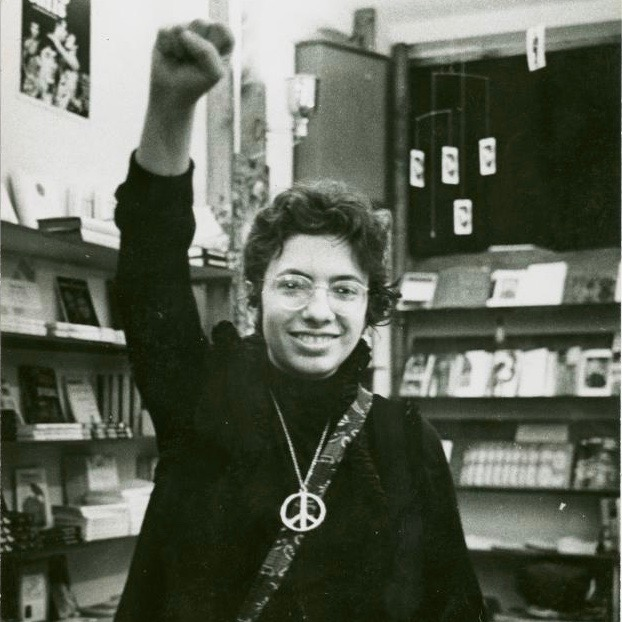
Martha Shelley was a founding member of the Gay Liberation Front, which formed in the wake of the legendary Stonewall riots in New York in June 1969. Stonewall and the creation of the Gay Liberation Front marked a shift among gay activists from a predominant philosophy of seeking respectability of the earlier gay organizations, such as Mattachine and Daughters of Bilitis, to one of militant assertion of gay identity. The gay pride march has been held on the last Sunday in June ever since, to commemorate the anniversary of Stonewall. But an interview with Shelley taught me something new about when the first march actually took place. Excerpts from our conversation:
You mentioned how you formed the Gay Liberation Front, which organized the first march. Was that in 1970, the year after Stonewall?
The first? No. The first march of 400 people was one month after Stonewall. The second one, the big one, I wasn’t part of organizing it, although I participated in it, that was the one in 1970. That first little one was the one that I started.
Was there a name for it? Was that called Christopher Street Liberation Day, or was that the year after?
No! It wasn’t called anything. There was an ad in the Village Voice, and people showed up. There wasn’t any name…
The Gay Pride March has changed so much over time. What are your thoughts on that?
The march became, of course, you know – as gay people got more and more socially acceptable, it became convenient for the corporations to put in these big floats. Sometimes, as I saw at San Francisco… we kept seeing these floats that were put on by breweries. You get these hunky guys dressed in nothing but a pair of—a dog strap practically—and dancing around blasting music… And these corporations will donate huge amounts of money to right-wing organizations at the same time as having a float at the Gay Pride March saying how wonderful they are and how they nicely they treat their employees. I am sure you’re very well aware of what Wells Fargo does. You know, it’s a criminal enterprise essentially. But you know, rah, rah, rah, they have a float at the gay pride parade. I find the whole thing completely disgusting.
This past summer, I went to New York….It was the fiftieth anniversary [of Stonewall] and so I participated in, you know, made speeches, got interviewed by the press. We had a Gay Liberation Front reunion. And I was one of the speakers at the rally before the Gay Pride March. The one that was, you know, essentially corporate sponsored.
But when I participated in the march, I went with Reclaim Pride.
So you spoke at the Heritage of Pride parade and then you went and you marched with Reclaim Pride, the new anti-corporate organization?
Right.Well I was asked by Gay Liberation Front to be the spokesperson at the, you know, the main march.
What did you focus on in that speech?
I talked about the Gay Liberation Front and the movement, how we started, and that we started as a small group of raggedy-ass poor kids. We had no funds. We just had our passion…. And then I said that, for me, the big issues of the day are twofold: One, climate change; two, the vast income inequality, which we talked about a little bit back then, but we had no idea how bad it was going to get. And then if we don’t deal with climate change, our gay rights aren’t going to be worth anything because we’ll be toast. Literally, we’ll be burnt up. And if we don’t deal with income inequality, our rights aren’t going to be worth anything either. Because what good are your rights if you have to work three jobs and still can barely make the rent?
You’re a serf, you’re nothing…
You were involved in the movement even before Stonewall.
Right.
There were events known as the Annual Reminders, which were kind of similar to the marches, right?
Okay, the Annual Reminder was something that happened in Philadelphia. They were the old-time gay movement people. So Mattachine, DOB [Daughters of Bilitis], and so on. They had this little march down at Independence Hall, and we all had to get dressed up. The girls had to wear skirts and the boys had to wear suits with ties. And we’d walk around with these printed signs [that said] equal rights for homosexuals, and that sort of thing. … I went to exactly one of those and that was the year before Stonewall. It always happened on July 4. And I felt like a complete idiot. I never dressed like that, because I had to [dress like that to] go to work and I hated it… And then we marched around and then there would be tourists coming to Independence Hall, standing there and looking at us. I remember this one kid, staring at us, a big kid, teenager, licking his ice cream cone and looking at us like they were staring at some exhibit at a zoo. So I really, really, hated that. I don’t know if it made any difference whatsoever to anybody in terms of changing, you know, the culture.
When you had this march with the Gay Liberation Front, was it really the first of the sort? What did that first march feel like with the Gay Liberation Front?
That 400-people march… I knew I was going to speak, I prepared that, and you know, I organized the thing. And I was somewhat scared too, because I know what happened to Martin Luther King.
So, I was afraid that you know, somebody would shoot me. Things like that could happen. Well when I got there, I wasn’t afraid anymore. I was just—I can’t explain how much I was on fire! And the same thing happened with other marches, other events…